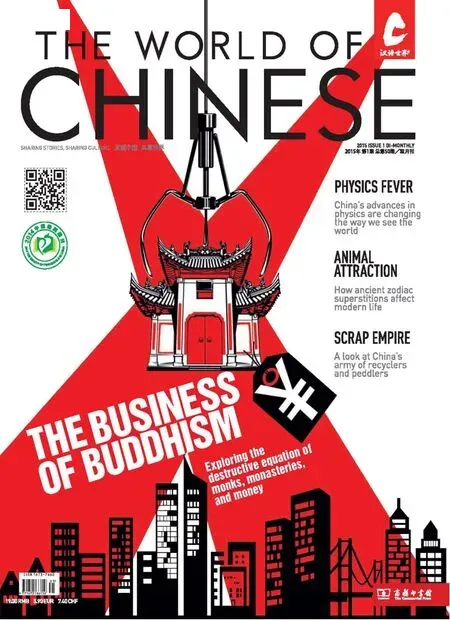Monastic Money, Science Supremacy, Trash Troops, and Zodiac Zeal
Monastic Money, Science Supremacy, Trash Troops, and Zodiac Zeal
Masters of kung-fu, sources of ancient and infallible wisdom, religious leaders beyond reproach—the Buddhist monk and the grand tradition of monasteries is of incalculable value to the culture of China. But the modern world brings with it something far more dangerous to these traditions than all the martial arts and religious purges in the world: money. For the faithful, the introduction of the free market is fi nishing off the work that the Cultural Revolution started. “Fake” monasteries have become the new norm, and places of worship are becoming money pits and tourist traps. While this modern trend does ensure the spread and popularity of Buddhism, purists and the monks are fi ghting against the tide and losing badly (see page 28).
Far from the realm of spirituality is that of science, and in that dominion none is more fundamental than physics. For years, the world has marveled as the Middle Kingdom has thrown itself into the world of science, and China’s current discoveries and ambitions are changing the way we understand the physical world. Communicating via photons over Qinghai Lake, hunting for dark matter beneath a mountain in Sichuan Province, fi nding dancing black holes galaxies away, and planning the most magnifi cent and important physics experiment the world has ever seen—China is the world’s new physics playground (see page 36).
From those lofty heights, we look to our garbage—to those some consider the lowest of society. The people we see with cardboard and plastic piled high on bikes and in bags, digging through rubbish to build a life on the trash everyone else leaves behind. They are over ten-million strong and they keep the country effi cient and clean, but their livelihoods and safety depend on the larger whims of the manufacturing and raw materials industry, a drop in which can be devastating. Find out more about these people, their role, and their fragile lives in “Scrap Empire” (see page 42).
Looking back up to the stars, we take a look at the Chinese zodiac and its importance to modern society. Be it Chinese or Western, astrology is objectively the worst kind of hokum, but in China these long held beliefs effect everything from birth rates to marriage booms. The younger generation seems to be throwing off the restraints of these traditions—even as they lean on the newly-vogue Western astrology—but the ties are still strong and the insistence of the older generation keeps these superstitions active and essential (see page 48).
If your tastes run a bit more toward the creative, check out Qu Guangci in our Gallery section (see page 58) for a look at a surreal, subjective utopia, or head on over to Dragon’s Digest (see page 12) for a new short story about a mother, a daughter, and a relationship gone wrong. If trivia is more your thing, try out Made in China (see page 24) for some porcine partying or our new column Time Machine (see page 74) for the sad tale of those who built China’s fi rst atomic bomb.
We’ve got all that and more inside, so cuddle up warm with a copy of our magazine for the last leg of this long winter, and, from all of us here at TWOC, enjoy and travel safely.
Managing Editor Tyler Roney

